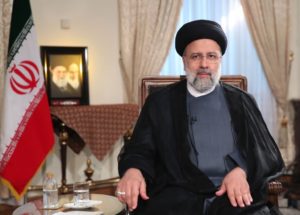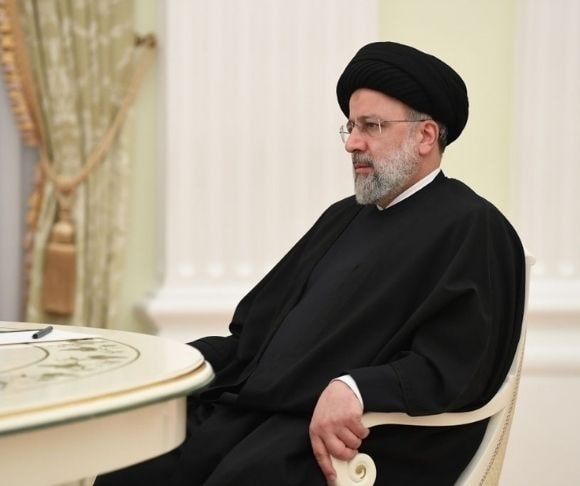The Iranian Parliament on Feb. 20 issued negotiation conditions to re-start nuclear talks with the U.S. and European diplomats. The IRNA news agency, Tehran’s official party-line information outlet, reported that 250 of the 290 parliamentarians published a letter for Iranian President Ebrahim Raisi to sign that laid out demands for Iran’s participation in the stalled 2015 Joint Comprehensive Plan of Action (JCPOA). It’s laughable: The Iranian ambassador to Moscow just four days earlier said emphatically Iran “would accept ‘no preliminary conditions’ for the potential start of new talks with the six global powers over the country’s nuclear program,” a Reuters dispatch reported. “I think that both sides know that there should be no preliminary conditions for these talks at all,” Iran’s ambassador to Russia, Seyed Mahmoud-Rez Sajjadi, told reporters.

Iranian President Ebrahim Raisi
(Photo by Iranian Presidency / Handout/Anadolu Agency via Getty Images)
Iran’s parliament demands the talks on halting Tehran’s nuclear program – which would involve envoys from Russia, China, Britain, France, Germany, the European Union, and United States — can have no pre-conditions, but Iran can have six. Iranian lawmakers made it clear that Iran has established “… a redline on the national interest by not committing to an agreement without obtaining necessary guarantees first.” Also confusing is the fact that Tehran’s demands came two days after a EU official predicted “an agreement in the coming week, the coming two weeks or so.”
Among the Iranian prerequisites are that no country can back out of a “restored” agreement and there can be no renewal of sanctions or “snapback mechanism” where sanctions can be put in place once lifted. That means that any terms and conditions arrived at for a new agreement cannot be enforced. That’s what Iran wants. With the JCPOA, there was little in the way of enforcement mechanisms.
For example, according to a Bipartisan Policy Center analysis of the 2015 agreement, compliance inspections of suspicious Iranian nuclear weapons development required 24 days’ notice that could be extended to 54 days if Tehran objected. In that amount of time, Iranians could move all the uranium-refining centrifuges and equipment and turn their nuclear bomb production facilities into amusement parks.
The fresh demands from Tehran get to the fundamental problem with the 2015 JCPOA and why any future agreement should look nothing like it. Before talks can begin, Iranians call for sanctions to be lifted while Iran continues to develop nuclear weapons and financial pressure eased for Tehran-sponsored terrorism, missile technology, and human rights violations. So this means Iranian leadership wants to claim unfettered opportunities to fund Hezbollah and Hamas rocket assaults on Israel and conduct missile and drone attacks on U.S. military bases in Iraq. In addition, Iran’s leadership does not want to be publicly rebuked for being a major supporter of terrorist networks worldwide.
 Iran’s conditions prohibit sanctions for current missile development efforts, like the latest test-firing of a new missile, “with a reported range that would allow it to reach both U.S. bases in the region as well as targets inside its archfoe Israel,” the Associated Press reported. If European and U.S. negotiators acquiesce to this nonsense to enable substantive talks, they would be green-lighting Iran’s aggression in the Middle East.
Iran’s conditions prohibit sanctions for current missile development efforts, like the latest test-firing of a new missile, “with a reported range that would allow it to reach both U.S. bases in the region as well as targets inside its archfoe Israel,” the Associated Press reported. If European and U.S. negotiators acquiesce to this nonsense to enable substantive talks, they would be green-lighting Iran’s aggression in the Middle East.
The 2015 agreement specified no limitations on Iran’s missile development and no prohibitions against terrorism toward its neighbors, which caused President Donald Trump to withdraw from it. Because the Obama administration went into negotiations with “an agreement or bust mentality,” which resulted in the JCPOA opening the door to what it was supposed to prevent, “The accord is riddled with problematic provisions that essentially put Iran on a legal glide path to the bomb,” Ray Takeyh, a fellow at the Council on Foreign Relations, explained in Politico.
Could the Biden administration acquiesce to Iran’s insane requirements in order to return to the discussions? Let’s hope not. Perhaps what Tehran demands is just tough-talk rhetoric, raising the stakes to allow Iranian negotiators some flexibility. That is a tactic the U.S. State Department representatives might take pointers from when engaging in Middle East nuclear deal talks.
The views expressed are those of the author and not of any other affiliation.
~ Read more from Dave Patterson.




